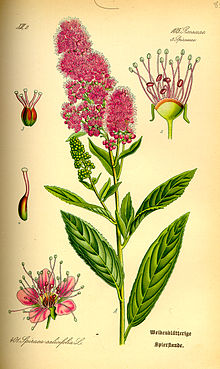Spiraea
| Spiraea | |
|---|---|
 |
|
| Spiraea salicifolia Illustration | |
| Scientific classification | |
| Kingdom: | Plantae |
| (unranked): | Angiosperms |
| (unranked): | Eudicots |
| (unranked): | Rosids |
| Order: | Rosales |
| Family: | Rosaceae |
| Subfamily: | Amygdaloideae |
| Genus: |
Spiraea L. |
| Species | |
|
About 80-100, see text |
|
About 80-100, see text
Spiraea /spaɪˈriːə/, is a genus of about 80 to 100 species of shrubs in the family Rosaceae. They are native to the temperate Northern Hemisphere, with the greatest diversity in eastern Asia.
The genus formerly included the herbaceous species now segregated into the genera Filipendula and Aruncus; recent genetic evidence has shown that Filipendula is only distantly related to Spiraea, belonging in the subfamily Rosoideae.
Spiraea plants are , deciduous-leaved shrubs. The leaves are simple and usually short stalked, and are arranged in a spiralling, alternate fashion. In most species, the leaves are lanceolate (narrowly oval) and about 1 to 4 inches (2.5 to 10.2 cm) long. The leaf margins are usually toothed, occasionally cut or lobed, and rarely smooth. Stipules are absent.
The many small flowers of Spiraea shrubs are clustered together in inflorescences, usually in dense panicles, umbrella-like corymbs, or grape-like clusters. The radial symmetry of each flower is five-fold, with the flowers usually bisexual, rarely unisexual. The flowers have five sepals and five white, pink, or reddish petals that are usually longer than the sepals. Each flower has many (15 to 60) stamens. The fruit is an aggregate of follicles.
...
Wikipedia
